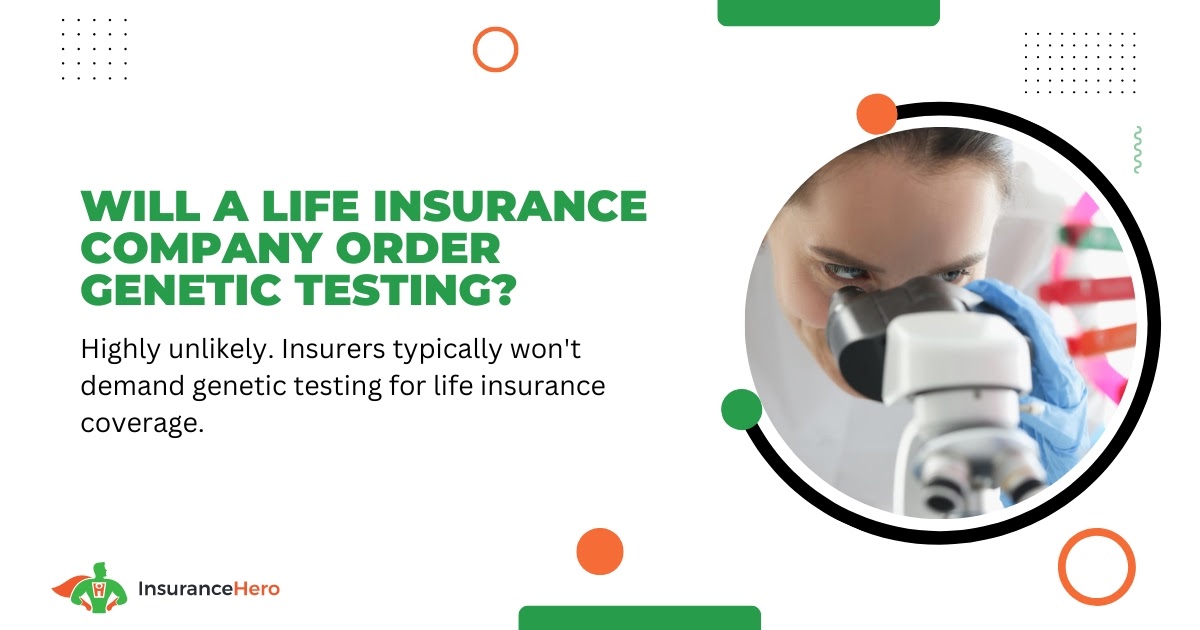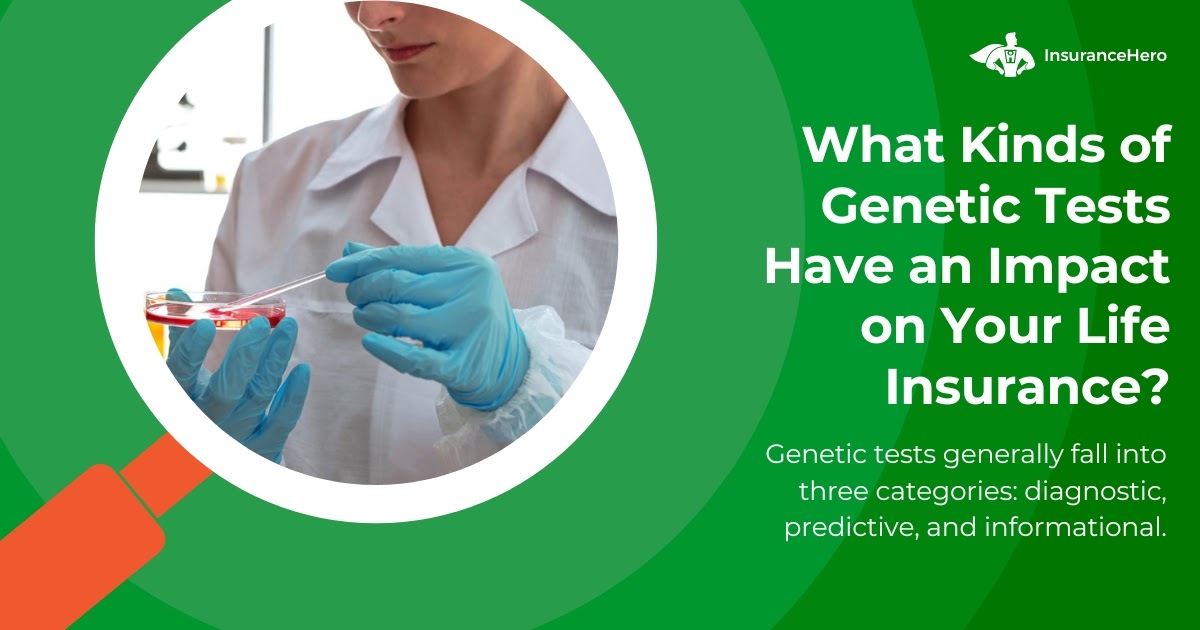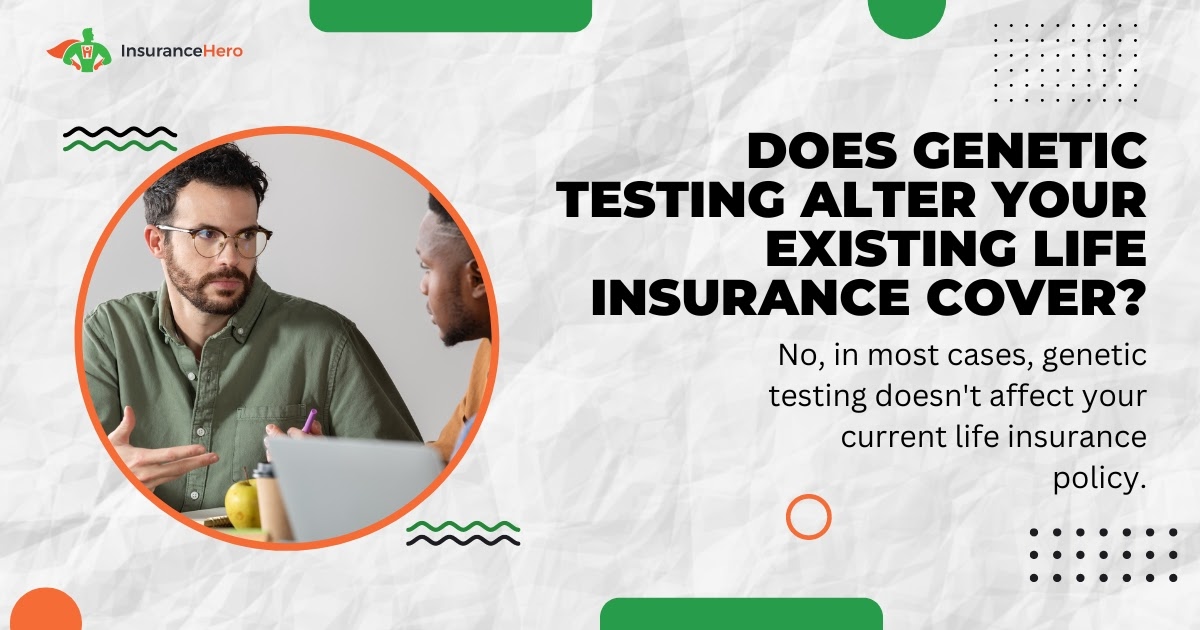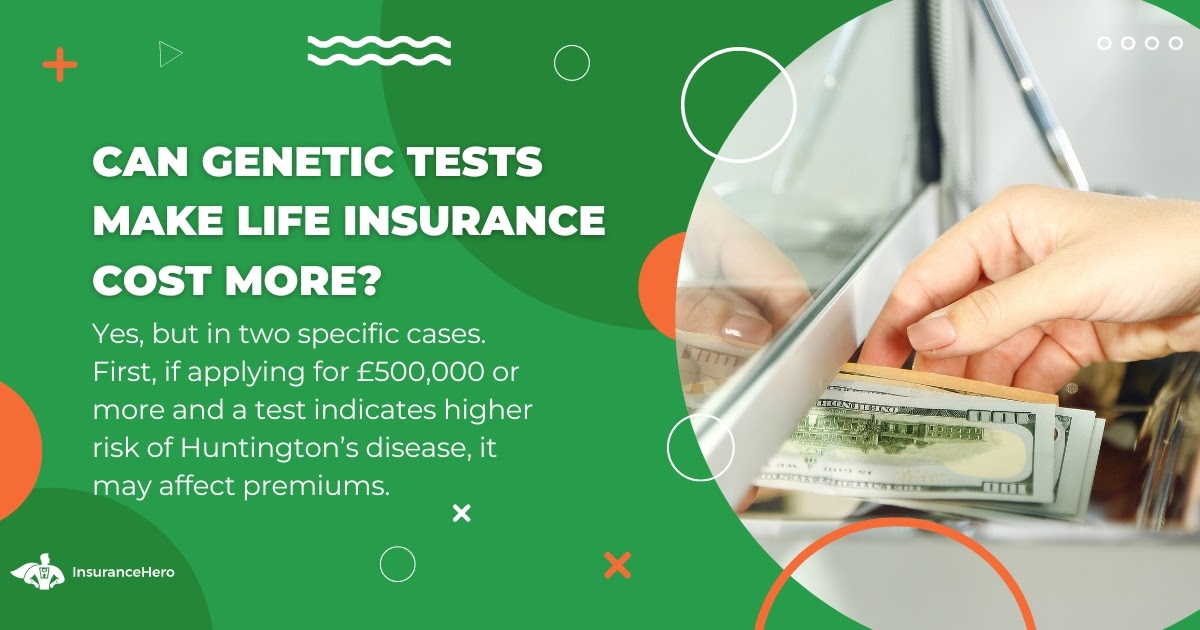Does Genetic Testing Affect Life Insurance Premiums?

A few decades ago, the idea of having your genetics tested was firmly in the realm of science fiction. Then, in 1990, a novel initiative to map the entire human genome was started.
That process, the Human Genome Project, was completed thirteen years later in 2003. Since then, our understanding of genetics as a society has skyrocketed, and what was once the realm of science fiction is now something you can order by mail.
These days, there are a variety of different genetic tests you can undergo. Some are by-mail tests to discover things like ancestral legacy; others are down to the individual gene level, looking for mutations that can indicate health risks.
That latter one might concern you. Regarding life insurance, your cover and premiums are determined in part based on your health and the risks you face from future illness.
If a genetic test indicates you have a higher risk of a certain disease, does genetic testing affect life insurance? Let’s talk about it.
Protect Your Loved Ones Today – Compare Life Insurance Quotes Online

Do You Need to Disclose Existing Genetic Testing?
First of all, let’s consider a simple situation. You have, in the past, had genetic testing performed. Now, you’re applying for life insurance cover.
Do you need to disclose the results of the genetic testing you have previously performed?
The answer is almost entirely no. There are, however, two caveats.
The first caveat is that when you apply for life insurance if the life insurance provider asks you for the results of specific tests that you’ve had, you have to answer.
The life insurance provider can request specific tests if they wish to. Generally, they aren’t going to ask you to get a test done, but they may ask if you’ve had specific tests done in the past.
However, if you have had tests done that are not the tests they ask about, even if they reveal something negative about your health, you don’t need to disclose them. You only need to disclose what an application specifically asks for.

The second caveat is that if you are applying for life insurance cover in an amount greater than £500,000 and have undergone a predictive test specifically for Huntington’s Disease, you will need to disclose the test results if requested.
The caveat to the caveat is the ABI’s CGTI. That is the Association of British Insurers Code on Genetic Testing and Insurance.
This code serves as a form of protection from genetic discrimination and establishes the rules outlined above.
The Code is voluntary for insurance providers to sign, but if they do, they agree to abide by its rules.
Those rules include:
- To not require or pressure you to have a predictive or diagnostic genetic test under any circumstances.
- Do not ask for or consider the result of a predictive genetic test if you are applying for insurance, with the single exception of the Huntington’s Disease test for high-value policies mentioned above.
So, if you’ve had any genetic testing done, you don’t have to disclose it, nor the results. The insurance providers generally will not ask.
Note that this only applies to the list of insurance providers who have signed the Code. Almost all of the best and the top insurance providers in the UK have signed on, but not all of them have, and it’s not mandatory by law to sign on.
If you’re curious about which providers have signed and which haven’t, the ABI maintains a list of the “genetic code signatories”, which you can find here.
So, as long as you’re applying for cover from one of the insurance providers on that list, you’re generally acceptable and will only need to disclose genetic testing in that one extreme circumstance. Otherwise, you typically don’t.
Will a Life Insurance Company Order Genetic Testing?
No, it would be highly unusual. Insurers, in general, aren’t going to demand genetic testing in order to get life insurance coverage.
There are two reasons for this. The first is the Code mentioned above, which most insurers have signed, stating that they won’t.
The second is simply that genetics are not that reliable. You can have all of the genetic markers of an early and fatal cancer and live a long, healthy life without ever developing it.

You can also develop many diseases without having the genetic markers for them. Genetics is only one piece of the puzzle, and it is not reliable enough for most insurers to be willing to make a decision based on it.
What Kinds of Genetic Tests Have an Impact on Your Life Insurance?
In general, genetic testing can be divided into three broad categories.
The first category is diagnostic genetic testing, which a physician orders to help identify what is currently going wrong with you.
For example, suppose you’re suffering from several symptoms that might point to a genetic autoimmune disease.
In that case, your physician might order diagnostic testing to determine if you have the underlying markers for that disease, making it more likely to be the diagnosis, which then informs your treatment and other risk factors.
The second category is predictive genetic testing. Predictive testing is testing you get as part of a research study, as a genetic panel, or for other reasons.
It is not meant to diagnose a specific current issue; instead, it checks for common or broad markers indicating higher risks for certain illnesses.
For example, women can be screened with genetic testing to see if they have the genetic markers that make them more susceptible to breast cancer.

The third category is informational genetic testing. This is a much less formal and less rigorous form of genetic testing, the kind you get from services like Ancestry, 23andMe, or MyHeritage.
These are usually aimed more at discovering your heritage than any specific information.
Of these three, only the first two might have any impact on your life insurance cover. The third, since it’s hidden, not handled by a healthcare provider, and tends to be less rigorous and less scientific, is generally worthless from a medical perspective.
Therefore, if you had a diagnostic genetic test to rule out cancer, a predictive test to check for cancer markers, or a similar test, might be relevant in some situations.
If you sent a sample to 23andMe and got a racial breakdown letter, your insurance provider doesn’t want to know and certainly doesn’t care about it.
Does Genetic Testing Alter Your Existing Life Insurance Cover?
No. In the vast majority of cases, once you have a life insurance policy and you’re covered, as long as you’re paying the premiums, nothing will change.
Even if your health takes a turn for the worse, your cover won’t change.
However, if you have term life insurance and you outlive the term, enrolling in a new term policy will likely have significantly higher premiums than before.
It makes sense, of course; you’re older, your health is likely worse than it was 20 or 30 years ago, and so on. You’re riskier to insure, so you pay more for the cover.

Genetic testing, however, doesn’t impact this. For the same reason that genetic testing won’t impact your application for a new cover, it won’t change your current cover, even if it’s relevant.
Can Genetic Tests Make Life Insurance Cost More?
Yes, but only in two specific circumstances.
The first circumstance is the one outlined above. You’re applying for £500,000 or more in cover, and you have a genetic test that indicates you are at higher risk of developing Huntington’s disease.
As of this writing, this is the only exception written into the genetics Code that the ABI developed. That said, other tests may be written in as exceptions.
The second circumstance is if you’re applying for coverage with a different insurance provider who has yet to sign up to participate in the Code.
The same rules do not govern those providers, and they can request whatever information they can obtain and make decisions based on it.
Generally, though, you want to work with an insurance provider that is more proactive about protecting individuals; if they aren’t signatories to the Code, look elsewhere.
Note that if you accidentally disclose the results of a genetic test when you’re applying for cover, and that test is such that you might be at higher risk than the average for a disease or illness, that test result will usually be ignored to avoid running afoul of the Code.
Most insurance companies will choose to ignore the result and won’t use it to increase your premiums, impose conditions on your cover, or refuse you cover entirely.
This is because they would need to do a lot of work to justify themselves or get in trouble with the ABI, so they choose not to.

Can Genetic Tests Make Life Insurance Cost Less?
If you’ve read all of the above and assume that genetic tests are more or less irrelevant to life insurance, you’re not entirely incorrect. However, one exception is when the results are positive and in your favour.
If you have had a predictive genetic test performed and it indicates that you are not at risk of a disease that might otherwise impact your rates, you can disclose it, and the insurance provider will likely choose to cancel out the risk factor.
As a simple example, maybe you’re a woman, and your mother and grandmother both developed breast cancer during their lives. A family history of breast cancer logically indicates that you are at higher risk of developing breast cancer.

So, as a proactive measure, you decide to have a predictive genetic test that looks for the markers that would indicate a predisposition to developing breast cancer.
However, you don’t have those markers to your surprise and relief. This means you’re less likely to develop breast cancer.
You can disclose this information to your insurance provider when you apply. Generally, they will treat it as a way to counteract the family history of breast cancer.
They don’t lower your rates from the baseline, but they also don’t raise them due to family history. It’s functionally the same but technically different.
This distinction is crucial because you can’t go and get a broad panel of genetic testing done to rule out markers for diseases you have no reason to fear you might have.
If you have no family history of a disease, a genetic panel that tells you you’re not at risk won’t improve your life insurance coverage.
If You Disclose a Genetic Test Result and Your Rates Increase, Can You Complain?
Yes. If your insurance provider—even one you’re applying to and have not yet signed up with—is a signatory to the Code, AND if you have disclosed the results of a genetic test and received a quote for higher rates than you might expect, you can complain.

You are entitled to ask the insurer to provide information about how they used the information about your genetics testing.
If you receive that information and believe the insurer is acting against the Code, you can complain to the insurer.
You can escalate the complaint if the insurer doesn’t readjust or issue a more valid explanation. Instructions on how to do so are found in the Code itself here.
How Can You Get the Best Insurance Coverage in the UK?
Perhaps you’ve undergone genetic testing and are concerned about your future. Perhaps you’ve undergone testing and discovered that you don’t share the same genetic markers as your parents, and you view it as an opportunity.
Whatever the case, there’s no better time to start shopping for life insurance.
Fortunately, we make the process easy. To get affordable, high-quality life insurance coverage, all you need to do is fill out a form on our page here.
We’ll submit that information to the best insurance providers in the country, and they’ll have quotes ready the same day. There are no obligations, either, so why not give it a try?
Steve Case is a seasoned professional in the UK financial services and insurance industry, with over twenty years of experience. At Insurance Hero, Steve is known for his ability to simplify complex insurance topics, making them accessible to a broad audience. His focus on clear, practical advice and customer service excellence has established him as a respected leader in the field.


